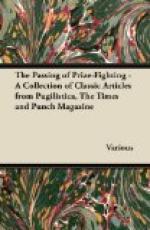In John Leech, His Life and Work (BENTLEY) Mr. FRITH quotes from an anonymous but obviously not an original authority, the dictum, “It is the happiness of such a life (as LEECH’s) that there is so little to be told of it.” Mr. BENTLEY has produced two handsome volumes worthy the reputation of his ancient and honourable house. They enshrine admirable reproductions of some of LEECH’s best work, selected by the trained hand and sympathetic eye of Mr. FRITH. These are and will remain the chief attractions of a work to which the Baron, in common with the civilised world, has been looking forward to with interest, and of whose realisation he regrets to hear so disappointing an account from his trusty “Co.” It is difficult to find dates in this higgledy-piggledy chance-medley of facts and opinions. But we all know that LEECH died in October, 1864. It was in Mr. Punch’s pages that he found the true field for his heaven-born genius For twenty years at least he was one of the most prominent, best known, and best liked men in England. Surely within that period there must lie to the hand of the dilligent seeker material for a memoir worthy to be linked with the name of JOHN LEECH. Mr. FRITH has not given us such a book, and criticism is only partly disarmed by the comical reiteration of confession that he has failed in his appointed task. For what he has to say in the way of making known to the world the man JOHN LEECH, a very thin volume would have sufficed, even had he included the more useful of his remarks on LEECH’s work and his method. But there being two volumes to fill, Mr. FRITH genially summarises The Physiology of Evening Parties, by Mr. ALBERT SMITH; Mr. Sponge’s Sporting Tour, and other not very high-class literature, whose only claim to being remembered is that LEECH illustrated them. Of The Marchioness of Brinvilliers, ALBERT SMITH’s attempt to rival the attractions of the Newgate Calendar, Mr. FRITH positively gives two whole chapters! He allots one to the Bon Gaultier Ballads, and nineteen mortal pages to telling the Story of Miss Kilmansegg, with copious extracts from that easily accessible work.
This is not Memoir-writing, it is book-making. The reader can skip these chapters, and, diligently searching, will find here and there a ray of light thrown on this beautiful placid life, weighed down as it was from earliest manhood by family circumstances at which Mr. FRITH delicately hints. “Give, give!” was, truly, the cry of the daughters of the horseleach. There are, however, several other anecdotes contributed by personal friends of LEECH’s, who have come to Mr. FRITH’s assistance, and succeed in the main in making the book an interesting one, as giving the outside world some glimpses of a sweet and manly character. The volumes are crowded with illustrations. These are LEECH’s own work, and make the volumes worth more than their published price.
THE BARON DE BOOK-WORMS & CO.




